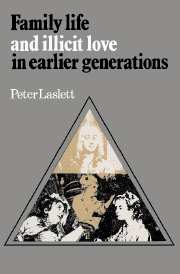Book contents
- Frontmatter
- Contents
- Introduction: the necessity of a historical sociology
- 1 Characteristics of the Western family considered over time
- 2 Clayworth and Cogenhoe
- 3 Long-term trends in bastardy in England
- 4 Parental deprivation in the past: a note on orphans and stepparenthood in English history
- 5 The history of aging and the aged
- 6 Age at sexual maturity in Europe since the Middle Ages
- 7 Household and family on the slave plantations of the U.S.A.
- Bibliography
- Index
5 - The history of aging and the aged
Published online by Cambridge University Press: 12 September 2009
- Frontmatter
- Contents
- Introduction: the necessity of a historical sociology
- 1 Characteristics of the Western family considered over time
- 2 Clayworth and Cogenhoe
- 3 Long-term trends in bastardy in England
- 4 Parental deprivation in the past: a note on orphans and stepparenthood in English history
- 5 The history of aging and the aged
- 6 Age at sexual maturity in Europe since the Middle Ages
- 7 Household and family on the slave plantations of the U.S.A.
- Bibliography
- Index
Summary
The twentieth-century Englishman and indeed everyone living in an advanced industrial society seems to have a guilty feeling about the elderly and aged. We uneasily suspect that most of our millions and millions of old people live in reduced circumstances, not much cared about by such children and such kin folk as they have left to them and rather distant from the life of any family; solitary, very many of them, and as they grow to be really aged, miserably relegated to institutional living. The peasant and the craftsman of traditional England, so the common sentiment seems to be, provided far better for the familial life of the old than we do today. It is for us to learn from them.
Aging in our society and aging in the traditional world
Gerontology, the study of aging as a process and of the old as a social group, is the next most recent of the social sciences, the newest of all being historical sociology itself. An early achievement of the gerontologists, an achievement which could be said, as we shall see, to be itself historical in its character, is the demonstration that the beliefs which are so widely held in late-twentieth-century high industrial society about the situation of the aged are scarcely well founded. Gerontological publications in print or in progress show that the majority of the aged are not in the position just described.
- Type
- Chapter
- Information
- Family Life and Illicit Love in Earlier GenerationsEssays in Historical Sociology, pp. 174 - 213Publisher: Cambridge University PressPrint publication year: 1977
- 5
- Cited by



